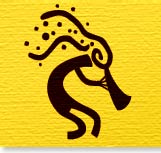
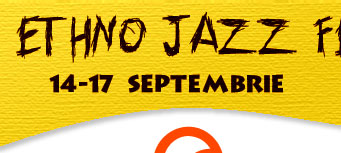
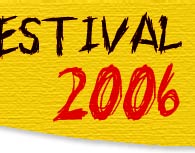



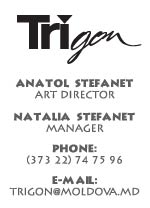 |
Center Atelierul Viitorului  Mariana Postica Executive director Phone: (37322) 52 27 04 avmariana@mail.md Media Signs Technologies Design company Ivan Pavlov - director Phone: (37322) 71 60 25 INFORMATION SUPPORT Siesta Logos-press OWH-TV |
 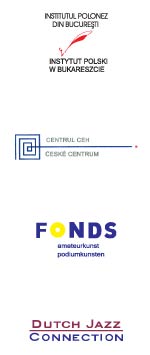  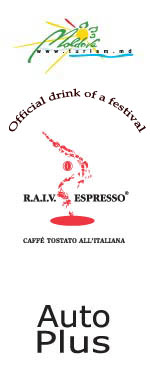 |
  |
Designed by BiOM
During five consecutive years, the Festival is offering to all inhabitants of Moldova a gift - an international fiesta of communication by way of music. Every single year the list of participants grows fast, introducing to the public new and famous talents. The Ethno-Jazz Festival, having already become a tradition, makes its own valuable contribution to the consolidation of cultural and social well-being of the country.
This-year festival, beside concert programs which took place in two cities of Moldova - Chisinau and Tiraspol, included a charity action with the goal to help children of Socii Noi Boarding School.
The Trigon art group, the NGO Atelierul Viitorului and MOLDCELL Company are pleased to announce that the sum collected from the box-office was used to purchase musical instruments for this Boarding School.
On October 2, the organizers presented the “Weltmester 96 - bas" accordion and a set of fluiers (flutes) to children from Socii Noi Boarding School.
On October 7, the Trigon group has celebrated its fourteenth birthday by making a present to the Boarding School Nr.1 from Chisinau - a piano and a drum set.
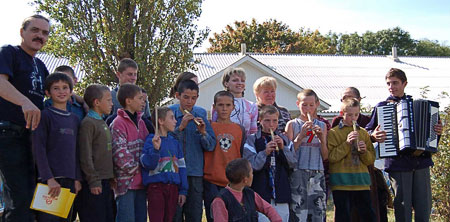
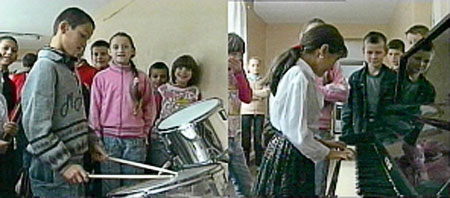
 |
MOLDCELL and ETHNO JAZZ
Theater, music, painting are those forms of non-verbal communication that are able to transmit the most subtle feelings and emotions despite differences in language, sex, nationality, and culture.
Ethno jazz occupies a special place in the musical palette of jazz. Having developed from popular music to refined music, it has preserved distinctive features of the cultures it represents.
This style is a unique combination of numerous cultures that is beyond comparison thanks to its emotional profoundness and sincerity that promotes three essential principles: love of life, understanding, and freedom.
These characteristics are close to MOLDCELL’s corporate soul and that is why today associating MOLDCELL with Ethno Jazz is something self-evident and not at all occasional.
Being faithful to the Festival for five years, MOLDCELL Company has the honor to contribute to the fact that thanks to this event Moldova has become a center of Ethno Jazz propaganda.
Along with the status of leader in implementing new technologies and that of a company, which contributes to the raising of mobile telephony level in the country to European standards, MOLDCELL has proved to be a socially responsible company that puts its heart and soul in everything it does. For five years already MOLDCELL’s soul and the soul of the Ethno-Jazz Festival are a single whole.
Best regards, faithful partner and mobile operator,
MOLDCELL
14 SEPTEMBRIE |
| Trigon |
| Moldova |
Vali Boghean – saxofon, trumpet, caval, fluier, vocal
Dorel Burlacu – keyboards
Gari Tverdohleb – tobe, percuţie, xilofon
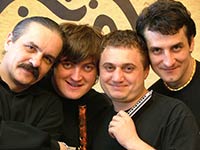 In the period elapsed after September 2005, the members of the group enriched their collection, already important, of prizes and other achievements – the solo CD of Anatol, included in a collection comprising 8 CDs of musicians from all over the world, has been awarded the Grand Prix of the Academy of Arts “Charles Cros” in France; Vali Boghean won the Big Prize of the national contest “Nicolae Sulac” and participated in the recording of Ana Barbu’s disc “On the Wings of Love”; Dorel Burlacu launched his author’s CD Trio 25th Frame and took part in the project “Silver Age”; Gari Tverdohleb, as usually, generously shared his time and talent with his numerous friends, participating in their numerous projects. Besides, in the course of the last year the group has been involved in the organization of our Festival, in daily rehearsals, in extensive tours, performed on the radio and TV, met with legendary jazz musicians - with Dave Holland in Italy and with Jean-Luc Ponty at the Garina jazz festival in Romania, and had its moments of satisfaction, reading the press after concerts in France, Russia, Italy, Austria, Germany, Romania, Slovenia, Ukraine, Hungary, Kazakhstan, understanding words that do not need translation:
In the period elapsed after September 2005, the members of the group enriched their collection, already important, of prizes and other achievements – the solo CD of Anatol, included in a collection comprising 8 CDs of musicians from all over the world, has been awarded the Grand Prix of the Academy of Arts “Charles Cros” in France; Vali Boghean won the Big Prize of the national contest “Nicolae Sulac” and participated in the recording of Ana Barbu’s disc “On the Wings of Love”; Dorel Burlacu launched his author’s CD Trio 25th Frame and took part in the project “Silver Age”; Gari Tverdohleb, as usually, generously shared his time and talent with his numerous friends, participating in their numerous projects. Besides, in the course of the last year the group has been involved in the organization of our Festival, in daily rehearsals, in extensive tours, performed on the radio and TV, met with legendary jazz musicians - with Dave Holland in Italy and with Jean-Luc Ponty at the Garina jazz festival in Romania, and had its moments of satisfaction, reading the press after concerts in France, Russia, Italy, Austria, Germany, Romania, Slovenia, Ukraine, Hungary, Kazakhstan, understanding words that do not need translation: “…Straordinario virtuoso” - All about jazz (Italy)
“...Artiste virtuose – Jurnal du Diois”, (France)
“...Die Ensembles der Virtuosen” - Burgenlandische Vilkszeitung (Austria)
“...Virtuose Ausnahmemusiker” (Germany)
“...Magnifico … Perfino create del Grandissimo gruppo Trigon. Una performance di grand classe”- Messaggero Veneti (Italy)
“…Fantastisch einfallsreich.. das grandiose begeisternde konzert – “Heilbronner stimme” 3 mai 2006 (Germany)
Their mix is incredible and unbeatable – Bassarabian folklore, brilliant fusion, experimenting in the style of modern academic avant-garde, everything based on a solid technique of highest level.
They are witty and inventive, ironical and easy and at the same time astonishingly serious, scrupulous and careful to every detail, and all this, I cannot help repeating, performed with an astoundingly high technical skill. Their music can be compared to a good picture – a beautiful general image and the most thorough attention given to the tiniest details. Their main feature could be defined as “they are perfectly organic”, the sign of the highest professionalism.
Anatol Stefanet is a musician who seems not to have any difficulty in his work – be it of technical or ”expressive” nature. I’ve read somewhere his description as the “Jimi Hendrix of the viola”. I would agree with this appreciation in the part of the perfect mastering of the instrument, when it looks like the natural extension of the player’s hands. But, in my opinion, Anatol is much more interesting as a musician.
Vali Boghean is amazingly talented. A virtuoso of all possible wind instruments – he plays the soprano saxophone, the cornet and a huge amount of traditional Moldovan wind instruments. Another of his instruments he is mastering perfectly is his voice – his vocalises are leaving you spellbound by their beauty; recently his talent was “officially” recognized – Vali received the Grand Prix at the national contest of traditional songs.
The piano player Dorel Burlacu is the rhythmic and harmonic base of the group, solid as a rock and a complex one. He impressed us as a soloist as well: Dorel is a great player on harmonica, a rare instrument in our part of the world.
Gari Tverdohleb is the master of all percussion instruments, a brilliant and original musician, possessing a flawless rhythm, the ability to outline the most refined nuances and to create a dense and intricate music.
Alliance Maidan, social and political newspaper, January 28, 2006
Sunny jazz in a bitter cold…There are no words to express our admiration in face of such a virtuoso mastering of all instruments on the stage, of the breathtaking passages of Ştefaneţ’s viola. There is no way to tell the sensation of being suddenly thrown from heat into cold. You listen to the dashing “Horantella”, a bewildering mix of the “Flight of the Bumble-bee” and of the Moldovan “Lark”, followed by “Japanese Blues”, and after that, Valentin Boghean starts to sing… Then you forget everything around you and you find yourself in the vast green plains under the sun of Moldova. And a piece of these plains and of this sun will always remain somewhere inside you, with the music of “Trigon”.
Kultura, no. 31, January 23, 2006
| Ondrej Pivec Organic Quartet |
| Czech Republic |
Libor Smoldas – guitar
Jakub Dolezal – tenor saxophone
Tomas Hobzek- drums
 Ondrej Pivec has created his first jazz quintet Mantis in 1999. Later he played in the jazz trio and in the blues project of the famous Czech jazz guitarist Roman Pokorny, as well as in the project of Cuban singer Yvonne Sanchez. In 2005 he started his own band called Organic Quartet. This talented group of young Prague musicians became at once the object of close attention of national and international critics ("Hammond beat" USA, "All about jazz" of New York) and has been hailed as the "Best Talent of the Year". The leader of the quartet, Ondrej Pivec, has won the first prize in the category "Best Soloist of the Year" at the Contest of Philips International Jazz Festival 2005. The original manner of Ondrej’s playing subdued musical critics and makes the audience to forget easily that there is no bass player on the stage. The music stems from traditional roots, but it carries definitely modern features. The quartet is playing its own original compositions, inspired by the giants of today's jazz, such as Kurt Rosenwinkel, Sam Yahel, Peter Bernstein, Brad Mehldau and Wayne Shorter, or influenced by great icons from other musical genres, as Led Zeppelin, Deep Purple, Ray Charles and the Beatles.
Ondrej Pivec has created his first jazz quintet Mantis in 1999. Later he played in the jazz trio and in the blues project of the famous Czech jazz guitarist Roman Pokorny, as well as in the project of Cuban singer Yvonne Sanchez. In 2005 he started his own band called Organic Quartet. This talented group of young Prague musicians became at once the object of close attention of national and international critics ("Hammond beat" USA, "All about jazz" of New York) and has been hailed as the "Best Talent of the Year". The leader of the quartet, Ondrej Pivec, has won the first prize in the category "Best Soloist of the Year" at the Contest of Philips International Jazz Festival 2005. The original manner of Ondrej’s playing subdued musical critics and makes the audience to forget easily that there is no bass player on the stage. The music stems from traditional roots, but it carries definitely modern features. The quartet is playing its own original compositions, inspired by the giants of today's jazz, such as Kurt Rosenwinkel, Sam Yahel, Peter Bernstein, Brad Mehldau and Wayne Shorter, or influenced by great icons from other musical genres, as Led Zeppelin, Deep Purple, Ray Charles and the Beatles. The quartet has performed at most Czech jazz festivals and abroad (FIAP Jean Monnet Paris, Jazz Club St. Germain Paris, Kunstfabrik Schlott Berlin etc.)
| mWWm marks weird world music * world crossover |
| (Senegal, France, Iran, Germany / the Netherlands) |
Raphael Vanoli –guitar
Mark Alban Lotz - piccolo, c-, alto-, bass-, pvc contra bass flutes, bansuri
Afra Mussawisade - percussion, vocals
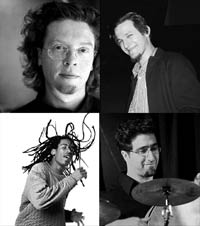 This group of post-modern dreamers and neo-shamans, working in the Netherlands, joined their effort on a musical and spiritual world crossover, uniting in their compositions African blues, world beat and solo improvisations.
This group of post-modern dreamers and neo-shamans, working in the Netherlands, joined their effort on a musical and spiritual world crossover, uniting in their compositions African blues, world beat and solo improvisations.This quartet of virtuosos, coming from different countries and different cultural traditions, is the brightest representative of Dutch improvising trend, gained an international acclaim, creating the “New Sound of the Dutch jazz ".
Senegal-born singer Omar Ka, with roots in the Niger, belongs to the West-African nomadic tribe of the Fula. Established in the Netherlands for more than 10 years, he actively popularizes the distinctive cultural practices and musical styles of the West-African Fulani on the European stage.
He has a dense concert activity with his group called Omar Ka & Fula Band, and participates in a big number of musical experiments. He constantly cooperates with a variety of European and African artists.
Multi-percussionist Afra Mussawisade was born in Teheran, where he studied features of national musical culture and Persian percussion style of playing.
Nowadays Afra incorporates different styles of percussion from all over the globe to a highly original and musical setup which makes him one of the most in demand percussion players on the European scene.
He performed with artists including the likes of Ernst Reisseger, Schal Sick Brass Band, Zuco 103, WDR Big Band, Joe Lovano, Scapino Ballet Rotterdam, Don Abi, SFEQ, Oene van Geel, Gabriel Perez, Praful and many more.
German flautist virtuoso, composer, producer, professor, music critic Mark Lotz grew up in Thailand, Uganda and Germany He studied jazz, classical and contemporary music at the Amsterdam 'School of Arts' in the Netherlands, in Bonn and at the Berlin University of ethnology and musicology, in Conservatory "Hilversum" and in the School of Arts in New York. Starting his professional career in 1984, now he is the prize-winner of Jazz Festival contests in Karlovy Vary, prize-winner of Jazz Festival Middlesea contests in 1990 and 1992, leader and participant of a huge number of orchestras and musical projects, author of music for theater plays, cinema, symphonic and jazz orchestras. His CD releases – often crossing borders with other cultures – gained much international acclaim.
Raphael Jean Baptiste Vanoli is an exciting and bright representative of the vibrant Amsterdam jazz and improvised music scene. His educational process - studying classical guitar with the famous professor Lydia Kennedy at the Conservatory of Amsterdam - did not prevent him from being active in alternative music, drum n'bass and electronically treated guitar, in searches of his own means of self-expression.
15 SEPTEMBRIE |
| Barretto, Eustaquio duo |
| Portugal |
Antonio Miguel R. Eustaquio – ghitara portugheza
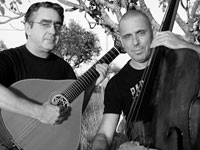 Born in Cascais, not far from Lisbon, Carlos Barretto fell in love with the double-bass when a teenager, at the first in Portugal jazz festival, organized in the place where he lived. Before his graduation of the National Conservatory of Lisbon in 1979, Baretto got initiated in the mysteries of a more liberal musical branch as a student of the first in this country school of jazz (under the auspices of Hot Clube de Portugal), conducted by Ze Eduardo, a renowned double-bass player. Following the tradition of local intellectuals, the young musician went trough two periods of “deliberate exile”: first, he mastered his classic skills with Professor Ludwig Streicher in Vienna, and next, in Paris, he collaborated with such personalities as Horace Parlan, Mal Waldron, Lee Konitz, and Barry Altschul. Back in Portugal in 1993, he contributed to the development of jazz in his home country.
Born in Cascais, not far from Lisbon, Carlos Barretto fell in love with the double-bass when a teenager, at the first in Portugal jazz festival, organized in the place where he lived. Before his graduation of the National Conservatory of Lisbon in 1979, Baretto got initiated in the mysteries of a more liberal musical branch as a student of the first in this country school of jazz (under the auspices of Hot Clube de Portugal), conducted by Ze Eduardo, a renowned double-bass player. Following the tradition of local intellectuals, the young musician went trough two periods of “deliberate exile”: first, he mastered his classic skills with Professor Ludwig Streicher in Vienna, and next, in Paris, he collaborated with such personalities as Horace Parlan, Mal Waldron, Lee Konitz, and Barry Altschul. Back in Portugal in 1993, he contributed to the development of jazz in his home country. Carlos Barretto is considered the leader of the mature generation, giving its brilliance to the improvised music of Lusitanian origin. Among his recorded successful collaborations I would cite Serene with Mal Waldron & Thierry Bruneau Quartet, Alone Together with George Cables Trio, Jumpstart with Bob Sands Quartet. In 1999, Carlos Barretto Quartet (Bernardo Sassetti, Mario Barreiros, Perico Sambeat) recorded the album Olhar, an impetuous transfiguration of the energy underlying the jazz in the country of the poet Fernando Pessoa. Gradually, the understanding of the fact that he must outline his individual attitude in the Babel of modern aesthetics led him to more and more personalized projects, such as solo improvisations, inspired by his own paintings (Solo Pictorico), or collaborations in the trend of interfering music, choreography and poems etc. … Carlos Barretto is coming into our cultural space with a recital that fits in the framework of the event. He is offering us a format of a duet where his improvised volutes on the double-bass have as a pendant the Guitarra Portuguesa. This instrument, belonging to the tradition of Lusitanian music, is played by Antonio Eustaquio. Guitarra is closely and intimately related to the genre called fado. It is less dynamic, due to its medieval sonority, than the Spanish variant of this instrument, but reflects more adequately the concept of saudade (longing), this concept uniting subliminally two cultures (Portuguese and Romanian), situated at the extremes of the Latin world. Antonio Eustaquio is a master of Guitarra Portuguesa, perfectly able to enter into a dialog with the most advanced modalities of jazz expression. The musician collaborated with world-renowned Irish company Riverdance. In the framework of the Golden Globe/SIC show, Antonio Eustaquio created an impressive fusion of Guitarra Portuguesa with Irish music. This empathy is understandable if we remember that, before being Romanized, the western territories of the Iberian Peninsula were populated by Celtic-Iberian tribes. The duet Barretto/ Eustaquio represents an inciting synthesis between the Lusitanian musical treasure and the libertarian and universal mentality of jazz.
VirgilMihaiu
| Pan Asian Ensemble Silk |
| Russia |
Dmitri Kalinin - koto, shakuhachi, voice, electronics, sound objects
Georgi Mnatsakanov - shakuhachi, sound objects, electronics
Piotr Talalai – percussions, drums
Ekaterina Lishanskaia - bangu
 The musicians of this ensemble share the same love and knowledge of traditional music of the non-European cultures (firstly from Far East and Southeast Asia) and the passion for experiment.
The musicians of this ensemble share the same love and knowledge of traditional music of the non-European cultures (firstly from Far East and Southeast Asia) and the passion for experiment. The masterly possession of ancient and modern music instruments - Japanese drums taiko, percussion instruments from China (bangu, gongs), Caribbean steel drums, percussion instruments from Africa, the Middle East, the ethnic wind-instruments (shakuhachi, di-dzi , coto), the knowledge of traditional cultures of the Far East and modern composition helps the group in creating a modern musical tradition. The group's strive may be interpreted as an attempt to create new music, based directly on musical traditions and their aesthetic principles.
The repertoire of the group includes author's and improvising compositions based on folklore traditions of the countries of the Far East region - Russia, Japan, China, Indonesia, Korea, pieces for percussion instruments, acoustic improvisations and works by composers working in electronic music.
This project began as an ensemble of drummers working with ancient traditions based on the Art Laboratory Class "Silk Way”. Yuri Rubyn, teacher of percussion class “Silk Way ", composes music for percussion instruments and collaborates with world and fusion music orchestras - Apricot Tree, Nineva, Intuitive Music Orchestra.
In the Centre “World Music Cultures" of the Moscow State Conservatory, he takes part in workshops guided by performers from Japan, China (The Taidzin Conservatory), Iran (The Teheran Conservatory). He studied the traditional culture of China, Indonesia, Japan in workshops guided by the teacher from Otsuka Dayko School from Tiba M Ebato city (Japan) and studied West-African culture with professor Т. Ondrushek from Music Academy of Prague.
Piotr Talalay, graduate of Gnesin`s Music Academy, is nowadays a well-known concert and session drummer and the participant of numerous jazz and fusion groups. He actively collaborates with Vladimir Chekasin, Alex Rostocky, Igor Butman, David Goloshekin, Alexandr Oseychuk, Paul Winter (the winner of Grammy Award), Jimmy Heath, Christian McBride.
Dmitri Kalinin graduated the Composition Department of Moscow State Conservatory. In 1994 he started to study koto (Japanese cither) - Ikuta-ru School, with teacher Keyko Ivahory. He hed two trainings at the Savay Tadao school from Kyoto. He studied shakuhachi flute with teacher Koheya Simidzu (Kinki–ru school) and took part in workshops lead by Mitiaki Okada, Kifu Mitsuhasi, Aoki Seodzi.
In 1999 - 2001 he studied Gou-chjen (Chinese 21-string cither), Gou-tsin and Siao in Shanghai Conservatory. From 1996 till 2004 Dmitri was the soloist and artistic director of the ensemble of Japanese music "Wa-On” at the Moscow State Conservatory, where he works with Georgi Mnatsakanov, who has got acquainted with shakuhachi flute in 1995, with teacher Om Prakasha (Germany). In 1998 his teachers were Koku Nishimura, Keyia Nobuhisi, Hanadu Kohey Semidzu, Mekiami Okadi, Kihou Mitsuhasy.
Ekaterina Lishanskaia studied the Chinese drums in Yuri Rubin’ class "Silk Way"; presently she is the soloist of Silk Percussion Ensemble.
16 SEPTEMBRIE |
| Maciej Sikala Quartet |
| Poland |
Cezary Paciorek – piano, accordion
Piotr Lemanczyk – contrabass
Tomasz Sowinski – drums, percussion
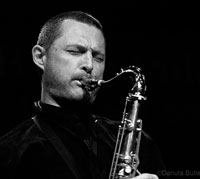
He gained approval and admiration playing with high-ranking groups: Quintessence, Milosc, Rodowicz Quartet, Kwintet Piotra Wojtasika, Kwartet Wojciecha Niedzieli, Sopot-Hamburg Jazz Quintet, Vintage Band. From 1998 until now Maciej Sikala has been playing in the trio format with Tomek Sowinski and Piotr Lemanczyk.
Piotr Lemanczyk is the laureate of International Competition Jazz Juniors '95 (composition and the best instrumentalist) and the winner of Jazz on Odra Competition 1996 (composition). He is the author of two solo CDs and collaborated to the edition of around other twenty CDs, recorded with the stars of jazz Jaroslaw Smietana, Zbigniew Namyslowski, Jacek Kochan, Ulf Atacker, Jakob Dinesen, Goran Larsen, Rivo Talfenau, Kent Sankster.
Tomasz Sowinski, a dynamic musician, is involved in concert activity in the country and abroad, playing with Janusz Muniak, Wojciech Staroniewicz, Leszek Mozdzer, Piotr Wojtasik, Slawomir Jaskulke.
Thanks to Cezary Paciorek, the accordion became a jazz instrument. Cezary received the title of the Best Jazz Accordionist, awarded by the "Jazz Forum Magazine" nine times in a row and is playing with groups and jazzmen like Mietek Blues Band, Janusz Ptaszyn Wroblewski, Emil Kowalski, Olo Walicki, Leszek Mozdzer in Poland, Israel, Switzerland, Slovakia, Germany, Romania, Japan, Hungary, the Czech Republic.
| Venusbrass |
| Germany |
Ulrike Hauptmann – trombone
Edith Steyer – saxophones
Larissa Scharnofske – drums
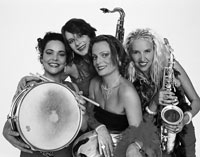 “Wild, womanly, virtuoso!!! The musical delicies of Jazz, Soul, Latin, Rock!
“Wild, womanly, virtuoso!!! The musical delicies of Jazz, Soul, Latin, Rock!When these magnificent musicians play together, they deliver a presentation of powerful explosive force at the highest professional level! . . . or maybe a little more? An energy-loaded stage act!”
The graduates of Berlin Conservatory from "Venusbrass" quickly subdued the public by a masterly possession of instruments and won a huge number of prizes at International Musical and Jazz contests, firmly occupying the first places in the jazz charts of Germany (Bettina Wauschke in the category “The best tuba solo musician”, Edith Steyer - in the category “The best tenor saxophone solo musician”).
Their energy conquers the most refined public and the most severe musical critics. They cause delight first of all by their professionalism. Venusbrass, this quartet of virtuosoes, in its original structure (tuba, two saxophones and drums), is the Hot Jazz played with a joke, inspiration and temperament.
Their repertoire impresses by its variety - from lyrical pieces to the demonstration of fantastic virtuosity, spiced with acting miniatures and spontaneous comic situations, transforming their concerts in a music show, the result being that the acoustic impression is at least doubled.
The main perpetrator of this magic action is first of all Bettina Wauschke, the leader of the group and a powerful tuba player. From the master quartet to large brass orchestras the full blood musicians heat around her. She played with Thomas Gottschalk, Harald Juhnke, Katharina Thalbach, Lester Bowie`s Brass Fantasy, Howard Johnson`s Gravity, Metallica and Berlin Symphonic Orchestra. The decision to play tuba was not a simple one, though Bettina has chosen this instrument in childhood, and dreamed to play modern music on it. But in 1986 in Berlin Conservatory there was no jazz or pop music department, let alone a jazz class for such an instrument as tuba. Bettina graduated the department of classic music, and became the first woman tuba player in Berlin. While in the Conservatory, she knew already that her place was in jazz. Her temperament would not allow her to be a small part of a large orchestra. Freedom of self-expression was what she needed, ant it was given to her by jazz.
17 SEPTEMBRIE |
| The Shin |
| Georgia |
Zurab J. Gagnidze – fretless electric and acoustic bass, Guruli vocals, song writing
Mamuka Gaganidze - vocals, percussion, doli
 The Shin formed in Germany in 1998, where Zaza Miminoshvili, Zurab Gagnidze, and Mamuka Gaganidze are established since 1994. In their Georgian homeland, these musicians are already living legends and belong to the artistic elite of the country: composers and performers Zaza Miminoshvili and Zurab Gagnidze wrote music for Robert Sturua’s productions for the State Theater in Tbilisi, and for many motion pictures as well. They were the prize winners of numerous jazz festivals. In 1992, Zaza Miminoshvili was named the best acoustic guitarist in Georgia. Mamuka Gaganidze records soundtracks with the famous Georgian composer Giya Kancheli. Zurab Gagnidze worked with Randy Brecker, Chaka Khan, Jatinder Thakur, Shankar Lal, Okay Temiz, Giora Feidman and many others. These days the group tours, records, and participates in numerous projects around the world. Their show with Randy Brecker at the 9th International Jazz Festival in Tbilisi in July 2005 was the highlight of the festival; at the 8th jazz festival «Jazz in the Hermitage Gardens» in Moscow the Shin received the audience’s first choice award.
The Shin formed in Germany in 1998, where Zaza Miminoshvili, Zurab Gagnidze, and Mamuka Gaganidze are established since 1994. In their Georgian homeland, these musicians are already living legends and belong to the artistic elite of the country: composers and performers Zaza Miminoshvili and Zurab Gagnidze wrote music for Robert Sturua’s productions for the State Theater in Tbilisi, and for many motion pictures as well. They were the prize winners of numerous jazz festivals. In 1992, Zaza Miminoshvili was named the best acoustic guitarist in Georgia. Mamuka Gaganidze records soundtracks with the famous Georgian composer Giya Kancheli. Zurab Gagnidze worked with Randy Brecker, Chaka Khan, Jatinder Thakur, Shankar Lal, Okay Temiz, Giora Feidman and many others. These days the group tours, records, and participates in numerous projects around the world. Their show with Randy Brecker at the 9th International Jazz Festival in Tbilisi in July 2005 was the highlight of the festival; at the 8th jazz festival «Jazz in the Hermitage Gardens» in Moscow the Shin received the audience’s first choice award.In Georgian “shin” means “the road home”. Even though each of us has our own personal road home and our own personal home, the music of The Shin has the amazing ability of leading everyone”home”. The music leads you somewhere you know you’ve been before, where the windows are fogged by the rain and it smells of food being cooked, where you hear voices and, though you might not understand what they are saying, you understand everything. This music leads you home, no matter how far away it is.
The Shin’s music brilliantly unites Georgian folk tunes with jazz, the unique vocal technique of Georgia with elements of flamenco, ancient eastern and modern western music.
The Shin’s „instrumental theatre“ is replete with cultural undertones. The music oscillates between pure joy of life (with lots of humour) and genuine solemnity. The Shin generates rhythmic-harmonic extensions, seasoned with exotic sound-spices from Europe’s South-Eastern frontier to the Orient. The group’s guruli-type polyphonies merge pagan ancestry with Byzantine celebration, under an all-inclusive, sui generis type of swing, whilst the specific sound of the Georgian language is adapted to jazz scat tradition. It is a masterly performance, displaying virtuosity, explosive temperament and sparkling humour of the musicians, as well as their remarkable emotional interplay and the special rapport that the musicians share with their listeners, literally enthralling the audience from their very first notes. This overwhelming acoustic-visual experience represents a highly original contribution to the development of music in the beginning of the 21st century.
| Hradcany |
| France |
Philippe Botta –saxophone
David Venitucci –accordeon
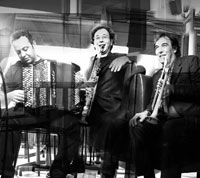 Serge Adam is a composer and trumpet improviser. The basic characteristic of his various projects is, above all, the encounter between multiple cultures and practices. This is how he created several ensembles, such as the big band Quoi de neuf docteur (What’s Up Doc) in 1983, Jazz MicMac (1994), and Haute Frequence (High Frequency) in 2000, uniting improvising soloists and the interactive video images of Eric Vernhes. He is the co-founder of the composers’ forum Polysons (1993) and of the trio Les amants de Juliette (Juliet’s Lovers, 1994) with Benoit Delbecq and Philippe Foch.
Serge Adam is a composer and trumpet improviser. The basic characteristic of his various projects is, above all, the encounter between multiple cultures and practices. This is how he created several ensembles, such as the big band Quoi de neuf docteur (What’s Up Doc) in 1983, Jazz MicMac (1994), and Haute Frequence (High Frequency) in 2000, uniting improvising soloists and the interactive video images of Eric Vernhes. He is the co-founder of the composers’ forum Polysons (1993) and of the trio Les amants de Juliette (Juliet’s Lovers, 1994) with Benoit Delbecq and Philippe Foch.A big part of Philippe Botta musical incentive is based on the encounter between world music and European improvised music. His work in Latin jazz and salsa (in the ‘80s) led him to Didier Squiban, Tito Puentes and Pedro Urbina. Starting from 1990, his interest in Mediterranean, Arab-Andalusian and Turkish influences resulted in collaboration with Keyvin Cheminari, Okay Temiz, Shamal Maitra. In 1991 he joined the Senem Diuyici Quartet with whom he did a world tour.
After studying at the Grenoble Conservatory, David Venitucci turned his interests toward jazz and improvised music. In Paris since 1994, his investigation opens to other domains like songs, the theatre and the circus.
He multiplies his encounters, plays and records with David Linx, Daniel Goyone, Christophe Wallemme, John Greaves, Romain Didier. In 2002, he records his first solo disc Cascade.
| Jazz Atmosphere |
| Ukraine |
Vladimir Strateiciuk – saxophone
Alexandr Vertelnikov –double-bass, contrabass
Dmitri Pautkin – keyboards
Alexandr Horev –percussion
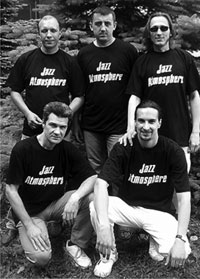 The repertoire of this quintet of young musicians includes pieces written by Alexandr Khorev and Dmitri Pautkin, and well-known jazz compositions. Roman Kulmatiţki, graduate of Institutes of Culture from Leningrad and Kiev, is now the soloist of the group Jazz Atmosphere, of the Philharmonic Dixieland Hor Jazz and of the Brass Band of the Department of Internal Affairs. Vladimir Strateiciuk, student at the jazz department at the Academy of Music of Ukraine, started his career in 2002, with the group Yunost, at the Vinnitsa jazz festival, took part in the festival „Slavianski Bazar” with the big band of the President of the country.
The repertoire of this quintet of young musicians includes pieces written by Alexandr Khorev and Dmitri Pautkin, and well-known jazz compositions. Roman Kulmatiţki, graduate of Institutes of Culture from Leningrad and Kiev, is now the soloist of the group Jazz Atmosphere, of the Philharmonic Dixieland Hor Jazz and of the Brass Band of the Department of Internal Affairs. Vladimir Strateiciuk, student at the jazz department at the Academy of Music of Ukraine, started his career in 2002, with the group Yunost, at the Vinnitsa jazz festival, took part in the festival „Slavianski Bazar” with the big band of the President of the country. Alexandr Vertelnikov, member of the chamber orchestra «Arkata», was the leader of the folk-rock group «Pereplet» and of the group «Klezmer shtetl ». He took part in international projects with musicians from poland, Russia, UK, Austria, USA.
Dmitri Pautkin strated his career in 2000 with the fusion group “Graffity”, participated in the project of producer Alexei Kogan “ROTHMANS JAZZ”. In 2000 – 2005 he toured, as member of the «VIA GRA» group, the United States, england, China, Japan, Monaco and the countries of the Middle East. . Alexandr Khorev started his career in 1997 as the author of the project “AL KHOREV Quartet”; with this group he took part in jazz festivals in Ukraine and in the project “ROTHMANS JAZZ”. He performed in circus shows P.G.”ROYAL” and “HARLEKIN” (Switzerland), played in the jazz trio of Max Gladetzki and in the jazz group of Yuri Shepeta.